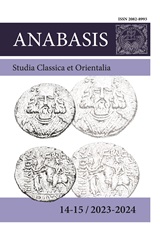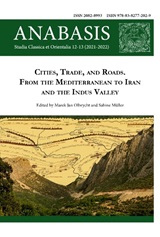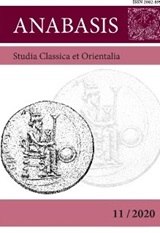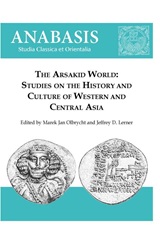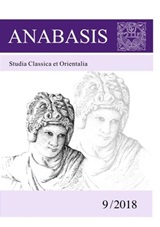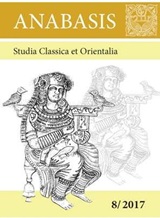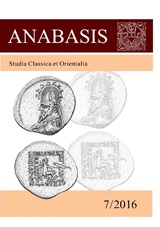Code of Ethics
Publication ethics and publication malpractice statement
For all parties involved in the act of publishing (the author, the journal editor(s), the peer reviewer, and the publisher) it is necessary to agree upon standards of expected ethical behavior. The ethics statements for the journal ANABASIS. Studia Classica et Orientalia are mainly based on the guidelines of Committee on publication ethics (COPE) and the ELSEVIER publishing ethics resource kit.
Responsibilities of Authors
Reporting standards
Authors reporting results of original research should present an accurate account of the work done. Fraudulent or intentional inaccurate statements constitute unethical behavior and are unacceptable. Underlying data should be represented accurately in the paper.
Originality and plagiarism
The authors should ensure that they have written entirely original works, and if the authors have used the work and/or words of others that this has been appropriately cited or quoted.
Multiple, redundant or concurrent publication
An author should not in general publish manuscripts describing essentially the same research in more than one journal or primary publication. Submitting the same manuscript to more than one journal concurrently constitutes unethical publishing behavior and is unacceptable.
Acknowledgement of sources
Proper acknowledgment of the work of others must always be given. Authors should cite publications that have been influential in determining the nature of the reported work.
Authorship of the paper
Authorship should be limited to those who have made a significant contribution to the conception, design, execution, or interpretation of the reported study. All those who have made significant contributions should be listed as co-authors. Where there are others who have participated in certain substantive aspects of the research project, they should be acknowledged or listed as contributors. The corresponding author should ensure that all appropriate co-authors and no inappropriate co-authors are included on the paper, and that all co-authors have seen and approved the final version of the paper and have agreed to its submission for publication.
Disclosure and conflicts of interest
All authors should disclose in their manuscript any financial or other substantive conflict of interest that might be construed to influence the results or interpretation of their manuscript. All sources of financial support for the project should be disclosed.
Fundamental errors in published works
When an author discovers a significant error or inaccuracy in his/her own published work, it is the author’s obligation to promptly notify the journal editor or publisher and cooperate with the editor to retract or correct the paper.
Responsibilities of Editors
Publication Decisions & Accountability
The editors of the ANABASIS are responsible for deciding which articles submitted to the journal should be published. In making the appropriate decisions, the editors should be guided by his own policies, the policies of the journal’s editorial board and/or the policies of the publisher, as well as, by the legal requirements regarding copyright infringement and plagiarism. The editors should maintain the integrity of the academic record and be willing to publish corrections/clarifications when needed.
Fair play
The editors should evaluate manuscripts for their intellectual content without regard to any non-academic matters relating to the author(s).
Confidentiality
The editor and any editorial staff must not disclose any information about a submitted manuscript to anyone other than the corresponding author, reviewers, potential reviewers, other editorial advisers, and the publisher, as appropriate.
Disclosure, conflicts of interest, and other issues
Unpublished materials disclosed in a submitted manuscript must not be used in an editor’s own research without the explicit written consent of the author(s). Privileged information or ideas obtained through peer review must be kept confidential and not used for personal advantage.
The editors should seek so ensure a fair and appropriate peer-review process. The editors should recuse themselves from handling manuscripts in which conflicts of interest are probable resulting from competitive, collaborative, or other relationships or connections with any of the authors or institutions linked to the papers. The editors should require all contributors to disclose relevant competing interests and publish corrections if competing interests are revealed after publication.
The Editorial Board insist on authors to reveal percentage of contribution of all authors involved in preparation of publication (it is necessary to inform about their affiliation).
Revealing malfunctions
Every single case of revealed mulfunction is exposed, including notification of appropriate institutions (i.e. authors' employees, scientific societes). All examples of malfunction in research are documented and kept in the archive of the ANABASIS.
Responsibilities of Reviewers
Contribution to editorial decisions
Peer review assists the editor in making editorial decisions.
Promptness
Any invited referee who feels unqualified to review the research reported in a manuscript or knows that its timely review will be impossible should immediately notify the editor so that alternative reviewers can be contacted.
Confidentiality
Any manuscripts received for review must be treated as confidential documents.
Standards of objectivity
Reviews should be conducted objectively. Personal criticism of the author(s) is inacceptable. Referees should express their views clearly with appropriate supporting arguments.
Acknowledgement of sources
Reviewers should identify relevant published work that has not been cited by the author(s). Any statement that an observation or argument had been previously published should be accompanied by the relevant citation. Reviewers should also call to the editor’s attention any substantial similarity between the manuscript under review and any other published studies.
Disclosure and conflict of interest
Privileged information or ideas obtained through peer review must be kept confidential and not used for personal advantage. Reviewers should not consider evaluating manuscripts in which they have conflicts of interest resulting from competitive, collaborative, or other relationships or connections with any of the authors, companies, or institutions connected to the submission.
Publisher Responsibilities
Editorial autonomy
The publisher is committed to working with editors to define clearly the respective roles of publisher and of editors in order to ensure the autonomy of editorial decisions.
Intellectual property and copyright
The publisher protects the intellectual property and copyright of the ANABASIS journal, its imprints, authors and publishing partners by promoting and maintaining each article’s published version of record. The publisher ensures the integrity and transparency of each published article with respect to conflicts of interest, publication and research funding, ethics, research misconduct, confidentiality, authorship, article corrections, retractions, and timely publication of content.
Scientific misconduct
In cases of alleged or proven scientific misconduct, fraudulent publication, or plagiarism the publisher, in close collaboration with the editors, will take all appropriate measures to clarify the situation and to amend the article in question. This may include the publication of a correction statement or erratum or, in the most obvious cases, the retraction of the affected work.

